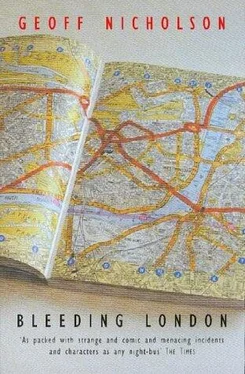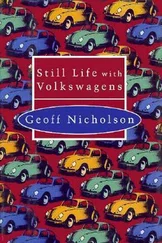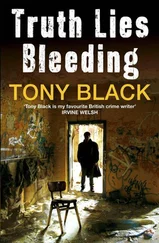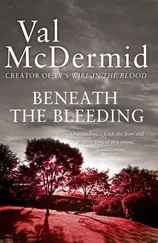The traffic wasn’t heavy. In fact Stuart thought that London traffic was never quite as terrible as people liked to pretend. By asserting that driving in London was a sort of hell people were allowed to feel that their own driving was brave and heroic. Stuart did not feel even remotely heroic. He felt like a buffoon and a bungler. The attempt at suicide had been laughable as well as futile. Fate had indeed let him down. But why had he needed fate at all? Why this desire to be passive? Why couldn’t he have found a high place and taken the matter into his own hands? It no longer seemed to be simply a matter of cowardice. Indeed, if he was keen enough or brave enough he could still do the deed right now, but he knew he wouldn’t.
Another problem then occurred to him. Was he going to record the day’s events, the day’s walk, in his diary? If he did, he would completely destroy his plan to leave a great unfinished work. He had imagined a printed text that would end abruptly and there would need to be some editorial insertion, a scholarly note about the exact circumstances of his death. Now he was in a position to write the final page himself, a page that was much more trashy, much less monumental than he’d wanted. But having survived the rough, confused, shambling events, he felt totally unequipped for transforming them into a diary entry.
He drove on and was home sooner than he wanted to be. As he parked the car he looked up at the house and saw that some of the lights were on. That was strange. Anita should have been at work, and he was pretty sure he’d turned everything off when he’d gone out. Still, a little wasted electricity didn’t seem worth worrying about.
He entered the house and shouted hello in case Anita was in. He thought his voice sounded perfectly normal and steady. He thought there was nothing in his demeanour that betrayed what he’d been through that day. The house was silent and nobody returned his greeting, but he wandered through the ground floor, and saw Anita’s coat and bag cast aside in the kitchen. He saw signs of coffee having been made, but he still heard nothing and he had to go up to the spare bedroom, the one they used as a home office, before he found her. She was sitting in the swivel chair, but she had it turned away from the desk and was reading a sheaf of loose pages. The computer screen was illuminated and the printer had recently been used.
“Didn’t you hear me come in?” he asked.
“I was engrossed,” she said.
“Did you decide to work at home?”
“Yes. Did you?”
“Yes.”
On any normal day he would have left it like that, gone downstairs and found himself something to do. But he wasn’t feeling back to normal yet. In fact he was feeling unexpectedly warm towards Anita. He knew that she had been spared. If there had been a bullet in that gun, then instead of dealing with paperwork in the spare bedroom she would now be dealing with the news that her husband had blown his brains out. He couldn’t quite conjure up a scene of Dickensian woe and grief but he still felt glad not to be putting her through such an ordeal. She may have been Boadicea to the staff but she could still be a soft, vulnerable thing in his eyes. He wanted to be with her, to stay in the room with her for a while and talk.
“What are you reading?” he asked.
“I’m reading your diary,” she replied nonchalandy.
It took a moment for him to understand what she’d said, but then he looked at the screen and recognized his own words there. Anita had found his disk, and the sheaf of papers she was holding was the print-out. Well, yes, that was all part of the plan. The disk was meant to be found, but not yet. It was intended to be a posthumous discovery. He felt as though he had been punched in the stomach, as though he was falling down a mine shaft.
“It’s not really a diary,” he said hastily and awkwardly. “It’s just sort of research I was doing for the business.”
“Don’t be ridiculous,” said Anita. “What possible use could the business make of knowing that a woman in Archway asked you to define the seven-year itch?”
Stuart launched into a number of rapidly abandoned explanations before felling into a judicious silence. He wondered how long Anita had been there, how much she’d read, how many of his secrets she knew.
“I can explain,” he said, and he tried to, he really did. He tried to tell her about his desire for knowledge, for completion and ultimately for obliteration, and Anita listened politely though not with great interest. When he could think of no more to say he picked up one or two of the printed pages, looked at her imploringly and said, “You believe me, don’t you?”
“There should be more of it,” she replied.
For one joyous moment he heard this as a sentence of praise, as though she loved what he had written, and he was starting to say thank you before he realized that the expression on Anita’s face wasn’t compatible with a demand for more of his prose.
“What I mean,” she said, “is that if you’ve really been walking ten miles a day, five days a week, and if you’ve now finished, having covered eight and a half thousand miles or so, then there should be a hell of a lot more than this. There would be at least three and a half years’ worth of diary here, probably much more. There should be thousands of pages.”
“Not necessarily,” he insisted. “There were lots of streets I had nothing to say about. There was no point forcing an observation. In those cases all I did was mark the street in the A — Z ”
“Ah, yes,” she said. “The famous A — Z .”
Stuart now realized that the blackened A — Z was bulging in his pocket. Anita put out her hand for it and he meekly passed it over. She looked at the pages with even less curiosity than Mick had displayed, and when she was done with it she dropped it on the floor like a discarded banana skin.
“Yes,” said Anita, “the A — Z is a nice touch but it’s hardly proof of anything is it? Any fool can sit down with a map and pen and black in streets.”
“Any fool can, but I didn’t,” he said. He was sounding a little desperate now, a little panicked. He added, “Anyway, you’ve only got one disk. There are others.”
“Are there really?” she said. “I doubt it somehow. I don’t make any claims to be a literary scholar, but I can smell a fake when it’s put under my nose.”
The room felt smaller and hotter than Stuart had ever known it. The ceiling was lower. The whirr of the computer fan filled his ears.
“Fake?” he said. “No. Absolutely not.”
He looked as though he might make a run for it, but Anita gave him a placatory smile and said, “Let me tell you what I think probably happened. I think that in the beginning you genuinely wanted to walk down every street in London. It sounds like you. I’m sure you intended to do it. I’m sure you planned to. But I suspect that before long it got very boring. It was all quite pleasant walking through Hampstead and Richmond and Kensington. And it was just fine walking through Highgate and Blackheath. Wandsworth and Stoke Newington had their problems, Lewisham and Leytonstone you probably didn’t like at all. And you knew there was going to be worse still: Peckham and Tottenham and Canning Town and God knows where else. I’m sure you weren’t a snob about it, probably you really did visit Brixton and Shoreditch and Wanstead. I’m sure you weren’t too delicate to walk through a bit of urban blight. But I imagine that before long you looked at all those remaining mean streets that led you through depressing council estates, and through boring, boring suburbs, and perhaps even into some dangerous no-go areas, and you thought to yourself, I don’t belong here. This isn’t my manor. This isn’t my London. And so you said to yourself, “Forget it.” And frankly I don’t blame you. Nobody would.”
Читать дальше












